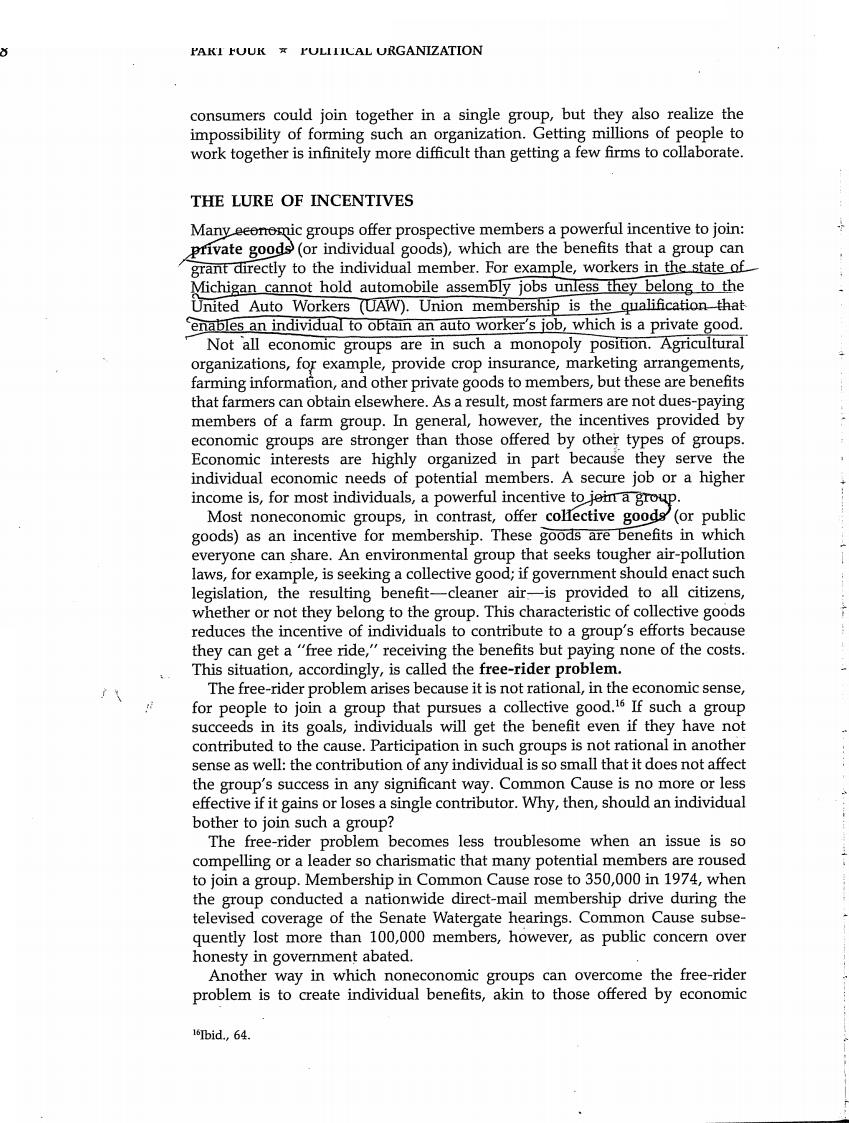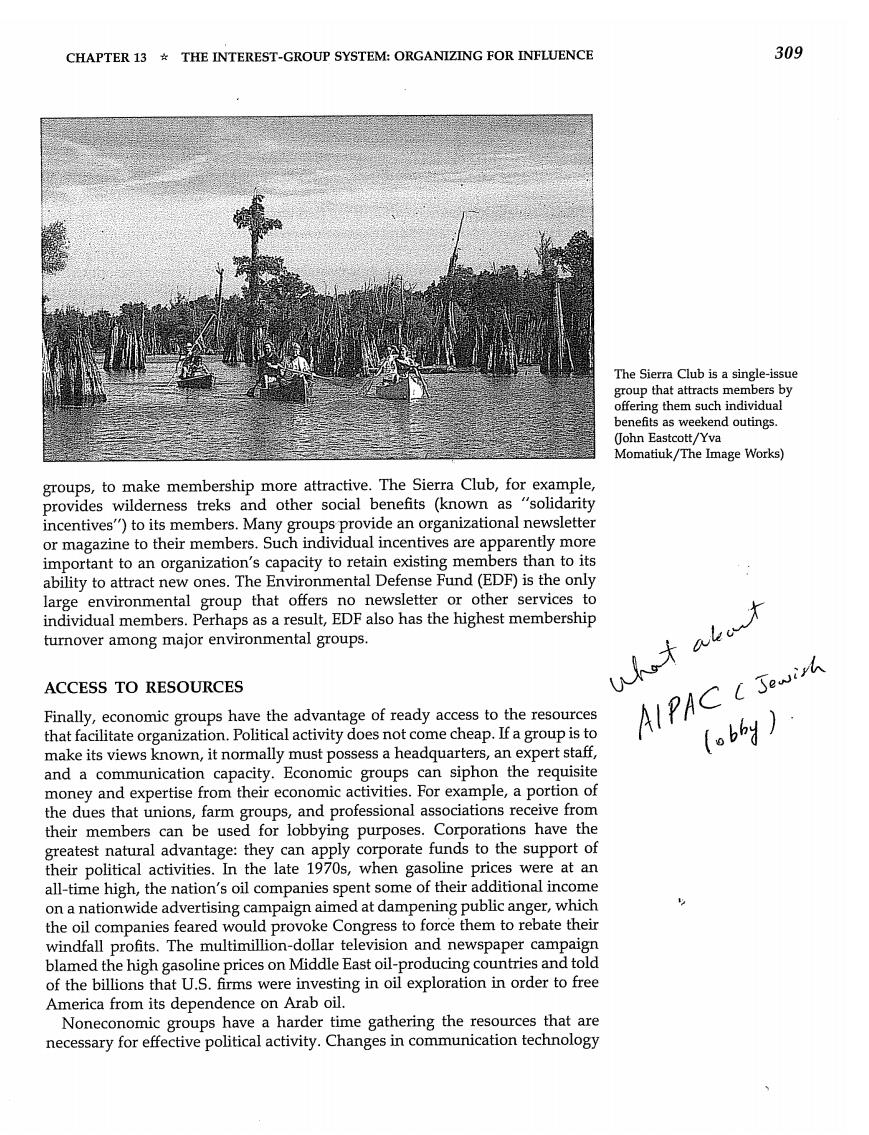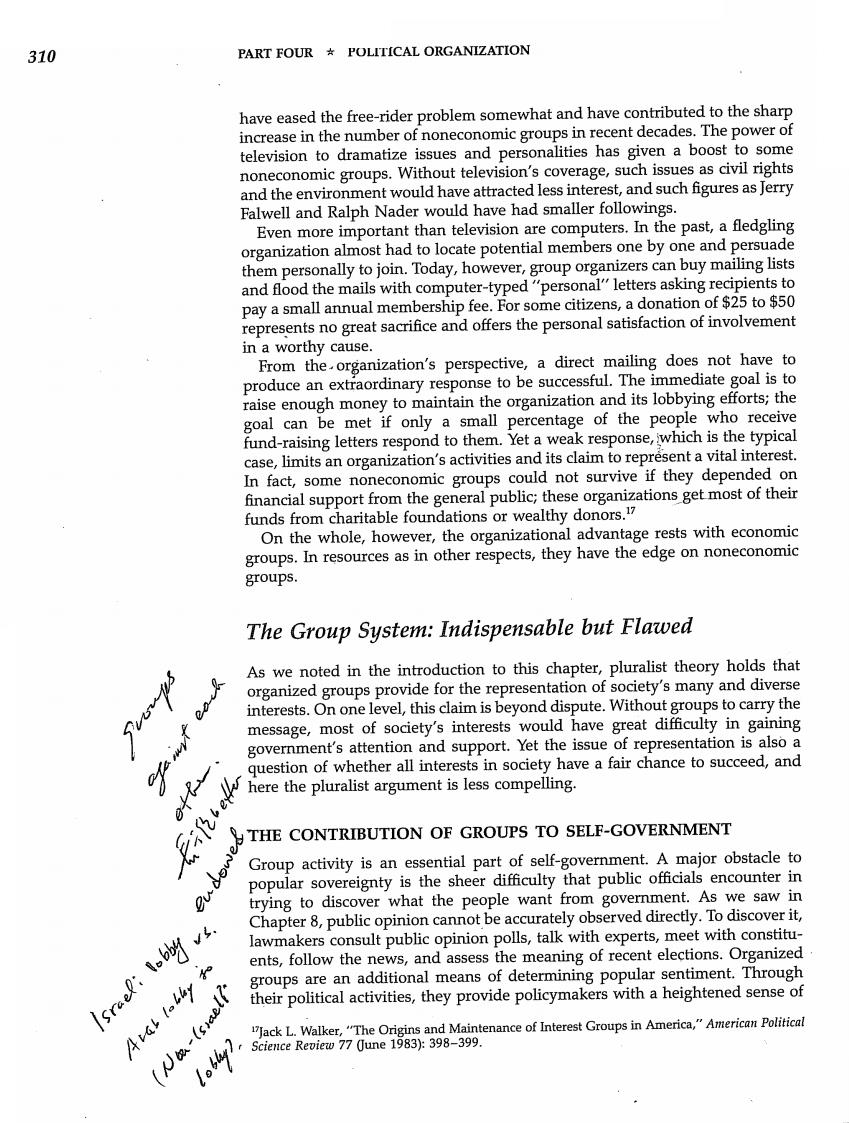
A FUUFULILILAL URGANIZATION practices have a great impact on foreign nations.For this reason,most foreign nations supplement the political efforts made through their embassies with the services of paid lobbying agents in Washington.Although lobbying by foreign governments is subject to some restrictions,most governments have managed to circumvent these vague regulations.In addition to sending their own agents to Washington,many countries hire American lobbyists to assist their efforts. Roughly 1,000 registered agents represent foreign nations'interests in Washing- ton.12 Subnational governments within the United States also have a major stake in many of the policies decided on in Washington.States,cities,and other governmental units go to Washington separately and in groups to lobby Congress.While most major cities across the United States and two-thirds of the states have at least one Washington lobbyist,cooperative lobbying is perhaps more important,The intergovernmental lobby includes such groups as the Council of State Government,the National Governors Conference,the National Association of Counties,the National League of Cities,and the U.S.Conference of Mayors.These organizations are,in essence,the trade associations of subnational governments.They represent the broad interests of cities and states while still allowing individual member cities and states to lobby for their particular interests.A second component of the intergovernmental lobby consists of organizations representing the concerns of bureaucratic specialists at the subnational level-for example,highway engineers,chief state school administrators,county welfare directors,and housing and redevelopment officials. The interests of subnational governments vary greatly.The problems of frostbelt states differ from those of sunbelt states;cities in the industrial Northeast face problems that are almost unknown in cities of the Southwest. These differences impose limits on the effectiveness of the intergovernmental lobby.Nonetheless,its presence in Washington has demonstrably influenced many major policy decisions that affect state and local governments.13 Why Not All Interests Are Equally Well Organized We have seen that economic interests are the most thoroughly organized.A further indication of their advantage is the fact that their Washington lobbyists outnumber those of noneconomic groups by roughly 4 to 1.There are in Washington: 4,000 lobbyists representing labor unions and trade and professional associations 1,250 lobbyists representing individual corporations 1,250 lobbyists representing noneconomic groups. Schlozman and Tierney,Organized Interests,54. DSee Donald H.Harder,Urban Governments Come to Washington(New York:Free Press,1974). Washington Representatives,1984,8th ed.(Washington,D.C.:Columbia Books,1984).In addition to the 6,500 lobbyists enumerated above,2,500 Washington lobbyists (mainly lawyers and consultants)represent multiple clients

CHAPTER 13 THE INTEREST-GROUP SYSTEM:ORGANIZING FOR INFLUENCE 307 TABLE 13-3 Advantages and Disadvantages Held by Economic and Noneconomic Groups Economic Groups Noneconomic Groups Advantages Advantages Economic activity provides the organization Members are likely to support leaders' with resources necessary for political political efforts because they joined the action. group in order to influence policy. Individuals are encouraged to join the group Disadvantages because of economic benefits they The group has to raise funds especially for individually receive (e.g.,wages). its political activities. In the case of firms within an industry,their Potential members may choose not to join small number encourages organization the group because their individual because the contribution of each firm is contribution may be too small to affect the significant. group one way or another. Disadvantages Potential members may choose not to join Persons within the group may not support the group because they get collective leaders'political efforts because they did benefits even if they do not join (the not join the group for political reasons. free-rider problem). The predominance of economic interests was predicted in Federalist No.10,in The most common and durable which James Madison declared that property is"the most common and durable source of factions has been the source of factions."Stated differently,nothing seems to matter quite so much to various and unequal distribution people as their pocketbooks and livelihoods.Actually,several factors(summa- of property. rized in Table 13-3)give economic groups an organizational advantage:their Federalist No.10 size,the incentives they offer members,and their resources. THE SIZE FACTOR Many economic interests naturally form into small rather than large groups.As the economist Mancur Olson notes,a small group has an inherent advantage in that each of its members stands to benefit sufficiently from a collective effort.15 The U.S.automobile industry,for example,has its "Big Three-General Motors,Ford,and Chrysler.Each firm's contribution to a collective lobbying campaign can make a measurable difference and produce extraordinary bene- fits.If U.S.automakers can persuade government to limit auto imports from Japan,for example,each stands to make millions in additional profits.Thus the Big Three automakers have a powerful incentive to work together. The automobile industry is representative of U.S.industry as a whole.The business sector is divided into numerous industries,most of which include only a small number of major firms.Virtually every industry,from oil to steel to cereals,has its own trade association.About 1,000 trade associations are represented in Washington,and they spend well over $100 million annually on lobbying. The situation confronting most industries is far different from that of,say, consumers,who number in the millions.The huge numbers of individual consumers make any one of them seem insignificant.John Doe in New York and Jane Roe in Montana may recognize that there would be advantages if all Mancur Olson,The Logic of Collective Action(Cambridge,Mass.:Harvard University Press,1965). 147

PAKI FUUK FULIICAL URGANIZATION consumers could join together in a single group,but they also realize the impossibility of forming such an organization.Getting millions of people to work together is infinitely more difficult than getting a few firms to collaborate. THE LURE OF INCENTIVES Many ecenemic groups offer prospective members a powerful incentive to join: -2 private goods(or individual goods),which are the benefits that a group can grant directly to the individual member.For example,workers in the state of Michigan cannot hold automobile assembly jobs unless they belong to the United Auto Workers (UAW).Union membership is the qualification that enables an individual to obtain an auto worker's job,which is a private good. Not all economic groups are in such a monopoly position.Agricultural organizations,for example,provide crop insurance,marketing arrangements, farming information,and other private goods to members,but these are benefits that farmers can obtain elsewhere.As a result,most farmers are not dues-paying members of a farm group.In general,however,the incentives provided by economic groups are stronger than those offered by other types of groups. Economic interests are highly organized in part because they serve the individual economic needs of potential members.A secure job or a higher income is,for most individuals,a powerful incentive to jei a group. Most noneconomic groups,in contrast,offer colfective goods(or public goods)as an incentive for membership.These goods are benefits in which everyone can share.An environmental group that seeks tougher air-pollution laws,for example,is seeking a collective good;if government should enact such legislation,the resulting benefit-cleaner air-is provided to all citizens, whether or not they belong to the group.This characteristic of collective goods reduces the incentive of individuals to contribute to a group's efforts because they can get a"free ride,"receiving the benefits but paying none of the costs. This situation,accordingly,is called the free-rider problem. The free-rider problem arises because it is not rational,in the economic sense, for people to join a group that pursues a collective good.6 If such a group succeeds in its goals,individuals will get the benefit even if they have not contributed to the cause.Participation in such groups is not rational in another sense as well:the contribution of any individual is so small that it does not affect the group's success in any significant way.Common Cause is no more or less effective if it gains or loses a single contributor.Why,then,should an individual bother to join such a group? The free-rider problem becomes less troublesome when an issue is so compelling or a leader so charismatic that many potential members are roused to join a group.Membership in Common Cause rose to 350,000 in 1974,when the group conducted a nationwide direct-mail membership drive during the televised coverage of the Senate Watergate hearings.Common Cause subse- quently lost more than 100,000 members,however,as public concern over honesty in government abated. Another way in which noneconomic groups can overcome the free-rider problem is to create individual benefits,akin to those offered by economic 16bid,64

CHAPTER 13 THE INTEREST-GROUP SYSTEM:ORGANIZING FOR INFLUENCE 309 The Sierra Club is a single-issue group that attracts members by offering them such individual benefits as weekend outings (John Eastcott/Yva Momatiuk/The Image Works) groups,to make membership more attractive.The Sierra Club,for example, provides wilderness treks and other social benefits (known as "solidarity incentives')to its members.Many groups provide an organizational newsletter or magazine to their members.Such individual incentives are apparently more important to an organization's capacity to retain existing members than to its ability to attract new ones.The Environmental Defense Fund(EDF)is the only large environmental group that offers no newsletter or other services to individual members.Perhaps as a result,EDF also has the highest membership turnover among major environmental groups. 人才ak才 ACCESS TO RESOURCES Finally,economic groups have the advantage of ready access to the resources AlPACc Soi that facilitate organization.Political activity does not come cheap.If a group is to (obhy)· make its views known,it normally must possess a headquarters,an expert staff, and a communication capacity.Economic groups can siphon the requisite money and expertise from their economic activities.For example,a portion of the dues that unions,farm groups,and professional associations receive from their members can be used for lobbying purposes.Corporations have the greatest natural advantage:they can apply corporate funds to the support of their political activities.In the late 1970s,when gasoline prices were at an all-time high,the nation's oil companies spent some of their additional income on a nationwide advertising campaign aimed at dampening public anger,which the oil companies feared would provoke Congress to force them to rebate their windfall profits.The multimillion-dollar television and newspaper campaign blamed the high gasoline prices on Middle East oil-producing countries and told of the billions that U.S.firms were investing in oil exploration in order to free America from its dependence on Arab oil. Noneconomic groups have a harder time gathering the resources that are necessary for effective political activity.Changes in communication technology

310 PART FOUR POLITICAL ORGANIZATION have eased the free-rider problem somewhat and have contributed to the sharp increase in the number of noneconomic groups in recent decades.The power of television to dramatize issues and personalities has given a boost to some noneconomic groups.Without television's coverage,such issues as civil rights and the environment would have attracted less interest,and such figures as Jerry Falwell and Ralph Nader would have had smaller followings. Even more important than television are computers.In the past,a fledgling organization almost had to locate potential members one by one and persuade them personally to join.Today,however,group organizers can buy mailing lists and flood the mails with computer-typed"personal"letters asking recipients to pay a small annual membership fee.For some citizens,a donation of $25 to $50 represents no great sacrifice and offers the personal satisfaction of involvement in a worthy cause. From theorganization's perspective,a direct mailing does not have to produce an extraordinary response to be successful.The immediate goal is to raise enough money to maintain the organization and its lobbying efforts;the goal can be met if only a small percentage of the people who receive fund-raising letters respond to them.Yet a weak response,which is the typical case,limits an organization's activities and its claim to represent a vital interest. In fact,some noneconomic groups could not survive if they depended on financial support from the general public;these organizations get most of their funds from charitable foundations or wealthy donors.17 On the whole,however,the organizational advantage rests with economic groups.In resources as in other respects,they have the edge on noneconomic groups. The Group System:Indispensable but Flawed As we noted in the introduction to this chapter,pluralist theory holds that organized groups provide for the representation of society's many and diverse interests.On one level,this claim is beyond dispute.Without groups to carry the message,most of society's interests would have great difficulty in gaining government's attention and support.Yet the issue of representation is also a question of whether all interests in society have a fair chance to succeed,and here the pluralist argument is less compelling. THE CONTRIBUTION OF GROUPS TO SELF-GOVERNMENT Group activity is an essential part of self-government.A major obstacle to popular sovereignty is the sheer difficulty that public officials encounter in trying to discover what the people want from government.As we saw in Chapter 8,public opinion cannot be accurately observed directly.To discover it, v. lawmakers consult public opinion polls,talk with experts,meet with constitu- Israee:ob ents,follow the news,and assess the meaning of recent elections.Organized groups are an additional means of determining popular sentiment.Through Aiak lolby (Na-( their political activities,they provide policymakers with a heightened sense of Jack L.Walker,"The Origins and Maintenance of Interest Groups in America,"American Political Science Review 77 June 1983):398-399